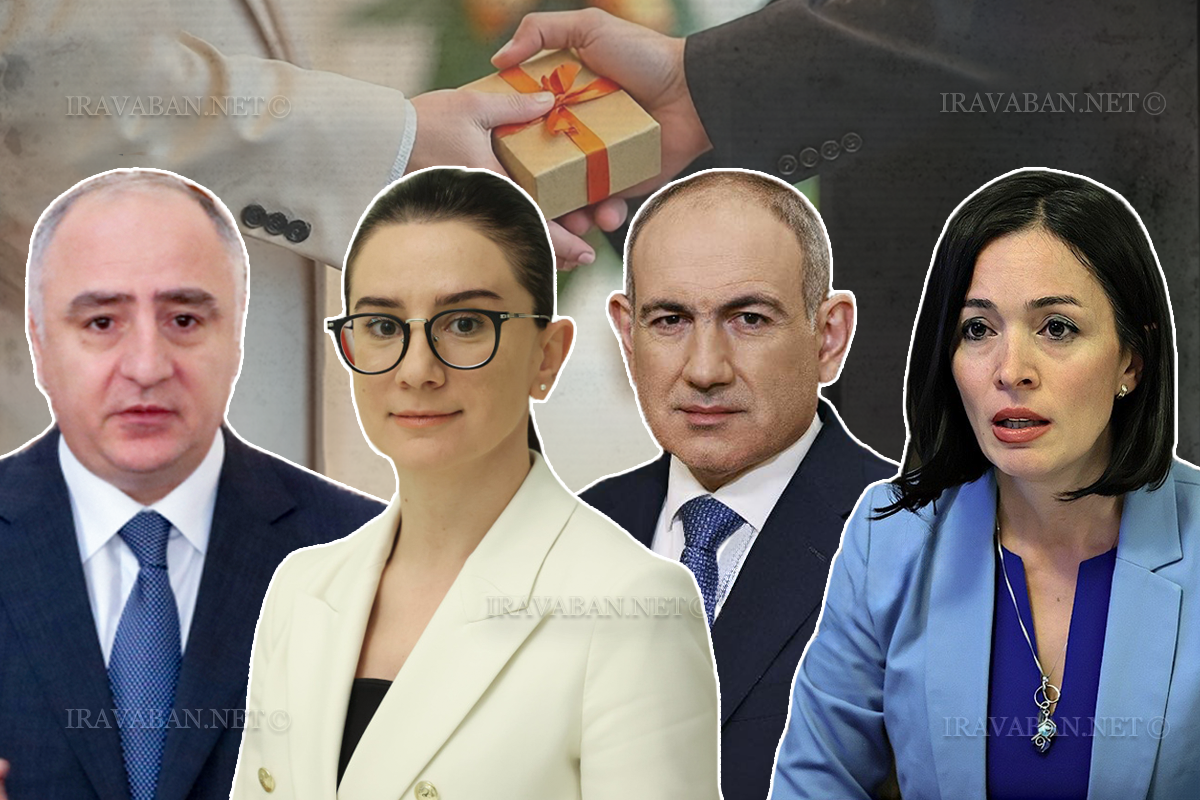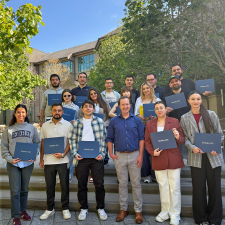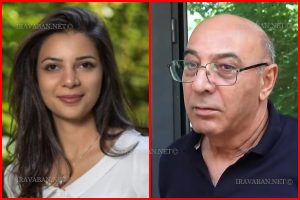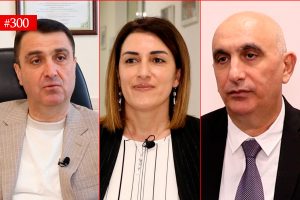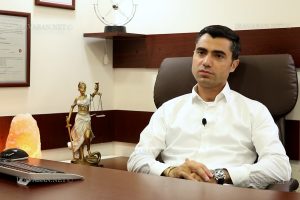Officials have begun submitting to the Corruption Prevention Commission (CPC) details about gifts received from others, including their value, donor information, and occasion for receiving the gift. Note that the CPC’s gift registry only includes gifts received by officials during September, November, and December 2024.
Iravaban.net presents data on gifts reported to the Commission by Prime Minister Nikol Pashinyan, Prosecutor General Anna Vardapetyan, Minister of Education, Science, Culture and Sports Zhanna Andreasyan, and former Chairman of the Anti-Corruption Committee Sasun Khachatryan.
According to data published by the CPC, Prime Minister Nikol Pashinyan reported the following gifts for December:
From His Holiness Pope Francis during his working visit to the Holy See, he received:
- Work titled “Tenderness and Love”
- A leather sculpture depicting St. Francis of Assisi (symbol of peace, humanity and respect for nature) on one side, and an image of the polluted endangered world on the other
Estimated value by recipient: 37,978 drams.
From Polish President Andrzej Duda during his official visit to Armenia: 3 pairs of cufflinks, 925 silver with amber and onyx stones.
Estimated value by recipient: 74,577 drams.
From Russian Government Chairman Mikhail Mishustin during the Eurasian Intergovernmental Council meeting in Moscow on December 13: “Winter Fairy Tale” tea set (20 pieces total: 1 teapot, 1 sugar bowl, 6 teacups, 6 small plates, 6 large plates).
Estimated value by recipient: 650,328 drams.
From Uzbekistan’s Prime Minister Abdulla Nigmatovich during the same meeting: “Ichan Kala” picture, handmade from brass (copper alloy with zinc and sometimes other metals), covered with 999 gold and enamel.
Estimated value by recipient: 627,733 drams.
From Kyrgyzstan’s Cabinet of Ministers Chairman Akilbek Japarov during the same meeting: A felt canvas created by Kyrgyz masters depicting the ancient Khor Virap monastery at the foot of Mount Ararat
Estimated value by recipient: 80,185 drams.
Prosecutor General Anna Vardapetyan received the following gifts in November:
From Tajikistan’s Prosecutor General: Commemorative plate, pen holder-clock, 2 coins.
Estimated value: 60,000 drams.
Occasion for receiving the gift:
- Bilateral meeting during the 34th session of the CIS Coordinating Council of Prosecutors General in Yerevan.
From Belarus’s Prosecutor General: Collection of coins and a separate coin.
Estimated value: 60,000 drams.
Occasion for receiving the gift:
- Bilateral meeting during the 34th session of the CIS Coordinating Council of Prosecutors General in Yerevan.
From Russia’s Prosecutor General: Series of 2 pictures symbolizing the Russian Prosecutor General’s Office.
Estimated value: 60,000 drams.
Occasion for receiving the gift:
- Bilateral meeting during the 34th session of the CIS Coordinating Council of Prosecutors General in Yerevan.
From Kazakhstan’s Prosecutor General: Glass commemorative statuette.
Estimated value: 60,000 drams.
Occasion for receiving the gift:
- Bilateral meeting during the 34th session of the CIS Coordinating Council of Prosecutors General in Yerevan.
From CIS Coordinating Council Secretariat: Wooden jewelry box.
Estimated value: 60,000 drams.
Occasion for receiving the gift:
- Bilateral meeting during the 34th session of the CIS Coordinating Council of Prosecutors General in Yerevan.
From Uzbekistan’s Prosecutor General: Wooden jewelry box, commemorative plate, commemorative shield, 2 pictures.
Estimated value: 60,000 drams.
Occasion for receiving the gift:
- Bilateral meeting during the 34th session of the CIS Coordinating Council of Prosecutors General in Yerevan.
From Kyrgyzstan’s Prosecutor General: Commemorative plate.
Estimated value: 60,000 drams.
Occasion for receiving the gift:
- Bilateral meeting during the 34th session of the CIS Coordinating Council of Prosecutors General in Yerevan.
From the Chinese Embassy in Armenia: Set of teapots, cups and teas.
Estimated value: 60,000 drams.
Occasion for receiving the gift:
- Bilateral meeting between Prosecutor General Anna Vardapetyan and Chinese Chargé d’Affaires Chen Min
Minister of Education Zhanna Andreasyan received in September: Saroyan’s graphic work and commemorative stamp from William Saroyan Foundation head during reception at the US Ambassador’s residence.
Estimated value: 577,000 drams.
Former Anti-Corruption Committee Chairman Sasun Khachatryan received: “Gnomon” type watch, 925 silver, weighing 7.23g from the Prosecutor General’s Office for the Committee’s 3rd anniversary.
Estimated value: 94,000 drams.
In January 2025, Anti-Corruption Committee Operational Intelligence Department employee Arman Sargsyan reported receiving: “Gnomon” type wristwatch with Committee inscription for showing initiative at work
Estimated value: 171,997 drams.
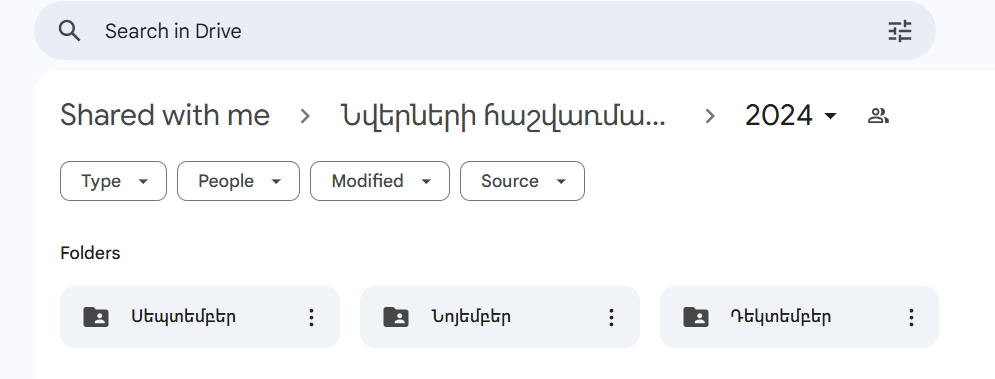
Let’s recall that the procedure for registering, submitting, and evaluating gifts received by public officials and public servants in connection with their official duties was implemented earlier.
Armenia has international obligations related to the implementation of the registry.
Syuzanna Soghomonyan, anti-corruption expert at the Armenian Lawyers’ Association, notes in conversation with Iravaban.net:
“Changes made to the RA Law on Public Service in 2022 established the legal framework for gift registration and submission, including the legal basis for creating a gift registry. However, in the two years following the adoption of legislative changes, the Commission has not ensured the implementation of an institutional registry. Creating a simple electronic spreadsheet and placing it on an online platform cannot be considered proper implementation of the legally mandated gift registry.
Previously, in professional discussions with the CPC, there was mutual understanding that a state information system would be developed, similar to the electronic system for declaring property, income, and interests of public officials. We, as civil society organizations specialized in anti-corruption, also expected the implementation of such a system.”
Let’s recall that based on Annex N 3 of the Corruption Prevention Commission’s Decision N 01-N of December 22, 2023, public officials or public servants must fill out various information in the gift registration form, including photographs of open internet sources used to determine the gift’s price or other publicly accessible price information, or other documents confirming the gift’s price.
After studying the list of gifts submitted to the Commission by these officials in September, November, and December 2024, Iravaban.net has submitted an inquiry to the CPC to clarify what methodology the aforementioned officials used to evaluate their received gifts, seeking information about the methods and criteria used for determining gift prices.
Additionally, through the inquiry, we tried to determine whether the CPC has conducted verification of the credibility of the presented gift price evaluations, and if so, what methods were used.
It is noteworthy that Prosecutor General Anna Vardapetyan has evaluated all gifts received from officials of different countries uniformly at 60,000 AMD, regardless of their type. This raises another question – whether the Commission has taken any measures to control and verify the real value of these gifts.
Let’s recall that if an official receives a gift exceeding 60,000 drams during state events, work visits, business trips, and other ceremonies, they must submit these gifts within 10 working days to the chief secretary of the respective body, or in the Prime Minister’s office – to the Prime Minister’s office manager. The chief secretary (or person in an equivalent position), or in the Prime Minister’s office – the Prime Minister’s office manager, must ensure the transfer of the gift to the State Property Management Committee within 5 working days.
In response to our inquiry, the CPC stated that Chapter 5, points 20-26 of Annex N 1 approved by the aforementioned decision establishes gift value assessment.
The CPC cited the regulation that gifts declared by public officials are evaluated by the recipient using data available in open sources on the internet, or publicly accessible information about prices of the same or similar goods or services.
While gift value assessment is defined by this procedure, reasonable doubts may arise about how the final value of a given gift can be determined by comparing with other goods from various internet platforms, and officials may evaluate received gifts at different price values in this case.
Moreover, regarding the methodology chosen for evaluation, the CPC responded that when using open sources, at least 2 similar sources are compared for price determination, or the primary source establishing the value for the good or service is used.
The Commission also referenced another regulation of the decision: for price determination purposes, the gift recipient may use all electronic and existing trading platforms (for example, amazon, e-bay, taobao, ozon, wildberries, other trade or service platforms operating in the Republic of Armenia or abroad).
It’s no secret that price fluctuations recorded on electronic trading platforms and the diversity of comparable product values give significantly different prices and can complicate the objective assessment of gifts. The purpose of regulations established by RA legislation is to determine gift values accurately, which under current conditions can only be ensured through independent expert assessment. Without having a unified and invulnerable methodology for gift value assessment and clear procedures for verifying credibility, the CPC cannot ensure proper implementation of its supervisory authority over the gift registration process. In particular, it turns out that unified assessment standards are absent, methodological guidelines for cases of price fluctuations are not defined, and value verification and control mechanisms are not sufficiently clarified.
In response to the inquiry, they stated that they are preparing to implement a separate system for determining gift values.
“Regarding the verification of gift value assessment credibility, it should be noted that in the electronic gift registry, which is already under construction and will be launched in May of this year, it is planned to implement automated solutions for determining gift values, which will allow automatically downloading the approximate value of received gifts. This will also ensure the credibility of pricing,” the response message states.
Regarding the second part of the inquiry, they stated that in the case of gifts received by the RA Prosecutor General from officials of different countries, Prosecutor General Anna Vardapetyan applied to the Commission in October 2024 to receive assistance as defined by Point 24 of the Decision (24. In all cases where it is impossible for a person to determine the gift’s value or the person has difficulty determining the gift’s value, they inform the Commission in writing to receive appropriate assistance.).
The Commission, taking into account that determining the value of received ceremonial gifts using data available in open sources or publicly accessible information is impossible due to their not being market goods, suggested using the value of similar ceremonial gifts provided within the framework of representative expenses budgeted for state bodies in the state budget as a basis for assessment.
Thus, studying the current practice of gift assessment and legislative regulations, it becomes clear that there is a serious problem. All gifts valued at the same amount – 60,000 drams – call into question the effectiveness of the gift assessment, registration, and submission institution.
The RA Law on Public Service requires assessment of reasonable market value of gifts (Article 29, Part 7), while the Commission’s proposed simplified approach of evaluating based on state budget representative expenses essentially bypasses this requirement. Such practice, as well as inadequate assessment of gifts’ real value, can become fertile ground for concealing valuable gifts and keeping them in circulation.
It is noteworthy that the Commission, while promising to launch the electronic gift registry in May, still does not have a clear methodology for objective assessment of gift values. The mere existence of an electronic system, without tools for accurate value determination, cannot solve the existing problems. In the current situation, it is necessary not only to ensure proper gift registration but also to develop transparent and clear criteria for their assessment, excluding the possibility of arbitrary interpretations.
Mariam Shahnazaryan

